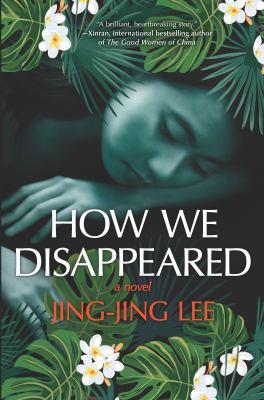
How we disappeared : a novel
Singapore, 1942. As Japanese troops sweep down Malaysia and into Singapore, a village is ransacked, leaving only two survivors and one tiny child. In a neighboring village, seventeen-year-old Wang Di is strapped into the back of a troop carrier and shipped off to a Japanese military brothel where she is forced into sexual slavery as a "comfort woman." After sixty years of silence, what she saw and experienced still haunts her. In the year 2000, twelve-year-old Kevin is sitting beside his ailing grandmother when he overhears a mumbled confession. He sets out to discover the truth, wherever it might lead, setting in motion a chain of events he never could have foreseen.
Available Copies by Location
| Location | |
|---|---|
| Community Centre | Available |
Other Formats
Browse Related Items
| Subject |
| World War, 1939-1945 > Singapore > Fiction. World War, 1939-1945 > Women > Fiction. Women > Singapore > Fiction. Singapore > Fiction. |
| Genre |
| Historical fiction. |
- ISBN: 9781335953759
- Physical Description 348 pages ; 24 cm
- Publisher [Place of publication not identified] : [publisher not identified], 2019.
Additional Information

Kirkus Review
How We Disappeared
Kirkus Reviews
Copyright (c) Kirkus Reviews, used with permission.
An elderly woman is haunted by her past as a "comfort woman," while many people would prefer to cover up their family member's tragic history.This novel set in Singapore grapples with a history that many in the city-state would rather leave forgotten. The story is told from alternating points of view, that of an elderly woman, Wang Di, facing the imminent death of her beloved husband; the teenage Wang Di and her family, struggling to survive the Japanese occupation during World War II; and Kevin, a precocious 12-year-old schoolboy facing bullying in the 21st century. Wang Di's narrative as a young woman is the most compelling, as the reader learns that the Japanese military kidnapped her as a teenager to work as a "comfort woman" providing sex for Japanese soldiers. Not only did Wang Di face the threat of death should she not comply while enslaved by the Japanese military, but she faced censure from the rest of society after the war ended. These themes of silencing a tragic history run through Kevin's chapters as well, as the intrepid boy seeks to uncover his grandmother's secrets. However, Kevin's chapters do not match Wang Di's in power, and the constant shifting of perspective can be distracting. The novel has many graphic scenes of violence and rape, but they are never gratuitous. Ultimately, debut novelist Lee creates a compelling story of generations haunted by war and the silence surrounding their suffering.A historical novel about "comfort women" in Singapore restores the dignity of the survivors and criticizes the misogyny that marked their lives. Copyright Kirkus Reviews, used with permission.

BookList Review
How We Disappeared
Booklist
From Booklist, Copyright (c) American Library Association. Used with permission.
In modern Singapore, the paths of a grieving WWII survivor and a young boy converge as they seek to heal long-buried wounds. When Wang Di's husband, Soon Wei, dies, she realizes that her fearful refusal to discuss their war experiences has left her with no knowledge of his life before they married. Prickling with regret, Wang Di searches for the story she couldn't bear to hear from him and relives her own harrowing experience as a comfort woman enslaved by the Japanese army. As Wang Di searches for Soon Wei's history, 12-year-old Kevin Lim is alone at his grandmother's deathbed when she confesses that his father is not her biological son. She found him in a village destroyed by the Japanese and raised him as her own, even after learning that his father was looking for him. Convinced that finding his grandfather will draw his father out of grief, Kevin traces clues from his grandmother's old letters and finds his way to Soon Wei. Wang Di and Soon Wei's wartime suffering is woven through the story's shifting time line (from 1941 to 2000), but Lee balances their pain with Wang Di's loyal friendships in the camp, her loving determination to honor Soon Wei's story, and Kevin's quest to heal his father's grief. A beautifully written, suspenseful story of redemption and healing.--Christine Tran Copyright 2019 Booklist

New York Times Review
How We Disappeared
New York Times
June 23, 2019
Copyright (c) The New York Times Company
The name given to the protagonist of this traumatic story sets the tone for what's to come: "Wang Di - to hope for a brother." Wang Di's is a Chinese immigrant family in Singapore in the years before World War II, her birth a disappointment, her life circumscribed by poverty and sexist tradition. In the best of times, a matchmaker might find her a decent husband with whom she can raise a family of sons, but these are the worst of times, and, before any match can be made, the Japanese Imperial Army takes Singapore and 17-year-old Wang Di is kidnapped to work as a "comfort woman," the chilling euphemism for a sexual slave. It's a challenging story to tell, and, as if to mitigate the horrors, Lee weaves two contemporary narratives through it, each harboring its own mystery waiting to be solved. At first, the quickly shifting timelines and characters are distracting: There's Wang Di, then and now, and Kevin, a 12-year-old boy in modern-day Singapore trying to make sense of a deathbed confession by his grandmother. His quotidian tribulations seem trivial in the face of Wang Di's torment, which Lee describes with necessary delicacy. "Things were done to me," Wang Di recalls, "that I would never speak about, could only deal with by believing that it was happening to someone else - 'Fujiko,' my changeling." As anticipated, the three narratives converge at the end, with some secrets revealed and some kept hidden, laying bare the long reach of the damage caused by war.


